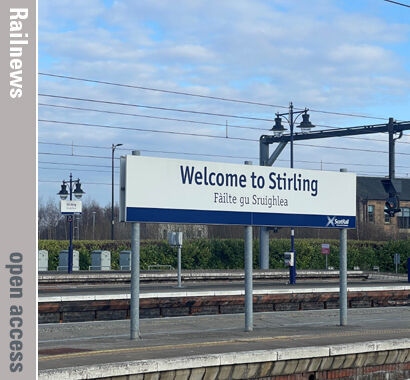Open access services are set to run between London and Stirling next year, after the Office of Rail and Road approved an application for four trains a day from Grand Union Trains, whose managing director is Ian Yeowart.
The ORR has already approved new Grand Union services between Carmarthen and London Paddington.
The regulator calculated that Grand Union will abstract revenue worth £24.4 million a year from existing operators, mainly Avanti West Coast. Established WCML operators like AWC have DfT contracts and currently pay all their earnings to the government, but the ORR said this abstraction would be offset by airline passengers who are attracted to the new services, and that ‘forecast abstraction of £24.4m for this application is within the range of previous applications we have approved’.
Grand Union Trains will introduce four new return services a day between London Euston and Stirling. Trains will call at Milton Keynes Central, Nuneaton, Crewe, Preston, Carlisle, Lockerbie, Motherwell, Whifflet, Greenfaulds and Larbert. Larbert, Greenfaulds and Whifflet will gain their first direct services to London.
Mr Yeowart has been promoting open access operation for more than 20 years. He set up the original Grand Central and tried, unsuccessfully, to launch cross-Pennine services between Newcastle and Manchester in 2003. Although these were rejected by the ORR a year later, the first GC services started running between London and Sunderland in 2007.
The new application has met resistance from some operators on the West Coast Main Line.
The ORR said Avanti West Coast and West Midlands Trains had opposed the application, saying that it would abstract ‘unacceptable levels of revenue’ from existing operators. They were also concerned about capacity and performance.
Grand Union is likely to use off-lease Class 221 Voyagers or Class 222 Meridians, although it added that ‘electric or dual mode trains are planned in the longer term’. Even so Avanti said it was unhappy about the ‘perpetuation of diesel operation’ on the WCML. Transport for Greater Manchester was also doubtful. Although TfGM agreed that the choice of diesel was ‘prudent’, so that services could start sooner, it was ‘regrettable from a carbon neutrality and air quality perspective’.
However, the ORR said ‘we do not view it would be appropriate to turn down new passenger services on the basis of diesel traction, especially on a route which has known electricity power supply constraints. Additionally, the proposal provides opportunities for travellers switching from air to rail travel, which would provide sustainability benefits.’
Stephanie Tobyn, who is the ORR’s director for strategy, policy and reform, said: ’Our decision helps increase services for passengers and boost competition on Britain’s railway network. By providing more trains serving new destinations, open access operators offer passengers more choice in the origin and price of their journey.’
Speaking before the application had been approved, Grand Union’s director of marketing and development David Prescott had said: ‘Each station has been chosen because of the benefits and opportunities it brings. Grand Union’s service will open up tourism opportunities, improve business options, provide new leisure travel opportunities and help reduce people’s reliance on air travel.
‘We will be able to provide people a faster and more comfortable journey and eliminate the need to change trains by avoiding Glasgow and Edinburgh, meaning people will be able to complete the journey from Stirling to London in just over five and a half hours.’


